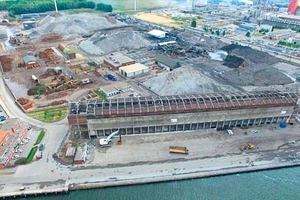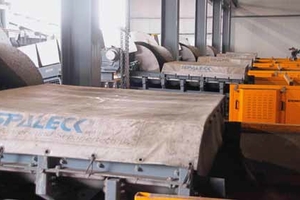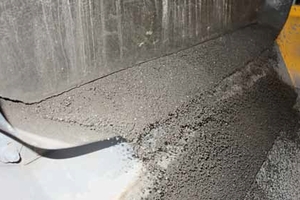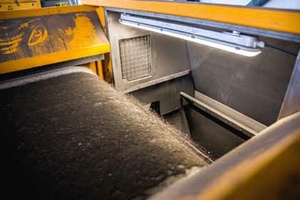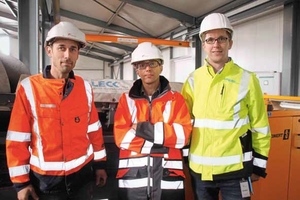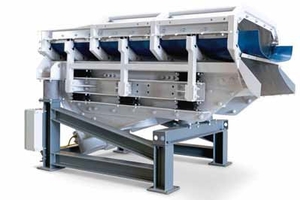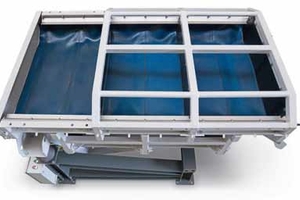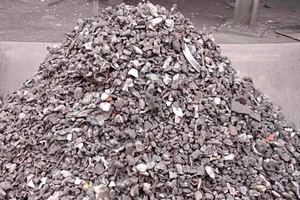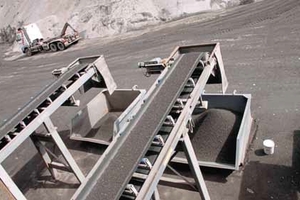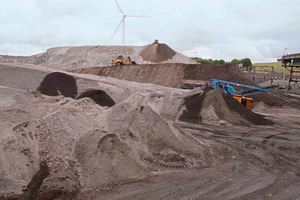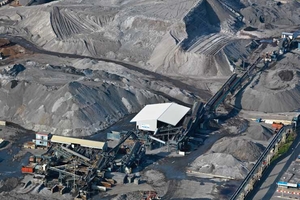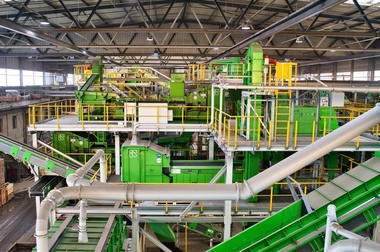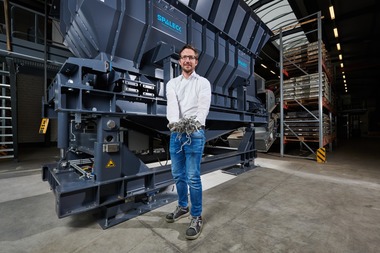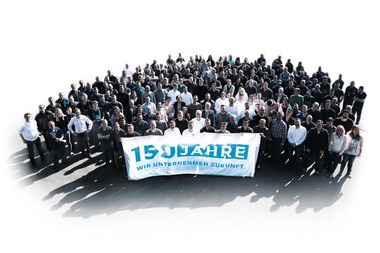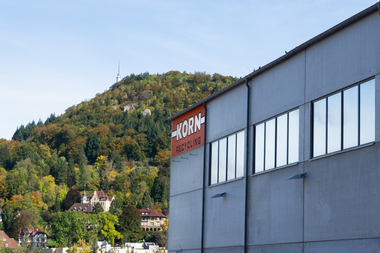Processing WIP slag at Heros Sluiskil – clean conveying with ActiveCLEAN
Processing slag from waste incineration plants (WIP), that means drying, crushing, screening, sorting, classifying – and conveying the slag. Despite drying in air, slag from waste incineration plants still contains 16–19 % residual moisture. When being conveyed, it tends to stick and cake. These characteristics have an adverse effect on sorting efficiency, especially in NF sorting plants.
Gerben Jaspers and his team from Heros Sluiskil sought a solution to this problem. Heros is a leading company in processing of waste incineration slag in the Benelux countries. The around 45-hectare company site in Sluiskil/Netherlands lies around 30 km west of Antwerp. In 2012, Remex Mineralstoff GmbH took over Heros Sluiskil. Around 100 people are currently employed at the site. About 700 000 t slag from the Netherlands and Belgium are processed here on site each year, around 45 % of the slag produced in the Netherlands comes to Heros. Thanks to the size of the facility, several million tonnes of slag can be stored on site – a fairly unique situation in the Netherlands. The raw slag delivered remains approx. six weeks on a stockpile – in that time it dries until it has a water content of just 16–19 % – only then can it be processed further. The sale of the processed slag is not continuous, depending on the number of infrastructural projects – it is an advantage for Heros to be able to store the processed slag in large quantities. For transport to and from the plant, the company operates its own harbor facilities, at least 90 % of all shipments are send via the waterways.
In the processing of such large quantities of slag, economically interesting quantities of FE and NF metal scrap are recovered. The quantities of the scrap contained justified a separate scrap processing plant, as well as an own separation plant for NF-metal that was also realized in 2016/2017. The separated heavy metals and aluminum can now be handed over directly to smelting furnaces. The processed slag is used in construction projects, e.g. as dry granulate for concrete production or for road construction. Heros thereby fulfils the obligations of the so-called Dutch “Green Deals to eliminate prejudices against the use of HMW-slags”, which means that the slags can be freely used without any restriction.
To meet the prescribed environmental regulations and to improve the quality, Heros has invested a total of 17 mill. €. Besides the metal sorting and the plant for separating the 0–2 mm fine fraction, an investment was made in a new solution for the belt feed to the NF sorting machines. Talking to Dr Petra Strunk, Editor-in-Chief at the journal recovery, Gerben Jaspers, project manager at Heros Sluiskil, reported on experiences and results of venturing down these new paths.
recovery: What problems are encountered during conveying of WIP slag?
Gerben Jaspers: The slag has a residual moisture content and tends to stick and agglomerate. For feeding the slag to the NF sorting equipment we have so far used vibrofeeders at the site. We struggled mainly with one problem: The slag cakes to the bottom of the vibrofeeders and has to be removed manually several times per day by one of our employees – otherwise the slag does not spread evenly over the vibrofeeder and the efficiency of the downstream NF sorting is significantly impaired. With around ten vibrofeeders, one operative is employed full-time just with cleaning. Another problem is the agglomeration, that is the slag particles stick together, or even to already liberated metal particles. For NF sorting, the particles have to be well distributed and lie separate for detection on the belt. If they are clumped together, the sorting efficiency is correspondingly poor.
recovery: Has a solution been implemented to make conveying and sorting the slag more effective?
Gerben Jaspers: Heros enquired about vibrofeeders at the company Spaleck. Spaleck responded by presenting its new ActiveCLEAN vibrofeeder to us According to the specialists from Bocholt in Germany, the newly developed vibrofeeder could be the solution to our problems in slag processing. After several talks – the new feeders come at a higher price than the ones we originally enquired about – we came to the conclusion: If the ActiveCLEAN vibrofeeder we were offered fulfilled all the parameters claimed by Spaleck, it would be worth it for us.
recovery: That means, you have opted for the ActiveCLEAN?
Gerben Jaspers: Now, the feeder came fresh from development, so no long-term experience was available with the ActiveCLEAN from other slag projects. Yet Spaleck was absolutely convinced, so they offered us to test six ActiveCLEAN vibrofeeders. If we were satisfied after that, we would buy them. Otherwise Spaleck agreed to take the feeders back. Our project team weight the risks and then we installed the ActiveCLEAN feeders No. 2 to No. 7 from Spaleck, some of the only ones produced by then, in our new plant.
recovery: What motivated you to start this test?
Gerben Jaspers: First, we have known Spaleck for many years as a reliable business partner. Second, we saw the big benefit in that we no longer needed an additional operative to clean the feeders and, on account of the even material distribution on the feeder, an improved sorting output should be obtained.
recovery: What results did you get from the test?
Gerben Jaspers: The results forecast by Spaleck have been confirmed 100 % in the long-term test! We no longer have any caking, the material is always spread very evenly over the entire width of the flop-flow feeder. We are very satisfied with the performance – it is a really good solution for us.
recovery: Thank you for talking to us.
ActiveCLEAN flip-flow feeder
For ultimately clean and economic processing upstream of the sorting machines in processing of wet and sticky material streams. -No cleaning requirement, thanks to innovative ActiveCLEAN principle -100 % material flow & clean performance -Ensures optimum distribution of the material stream -Short amortization times -Can be retrofitted

